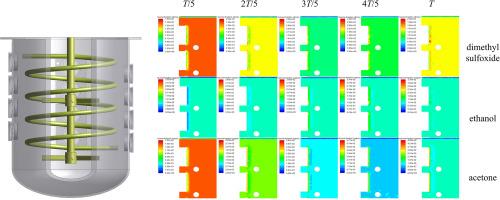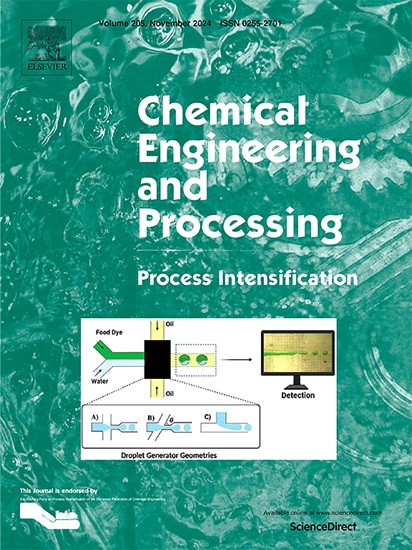Numerical simulation of fluid flow characteristics and ultrasonic cavitation performance in novel-designed stirred tank sonoreactor
IF 3.8
3区 工程技术
Q3 ENERGY & FUELS
Chemical Engineering and Processing - Process Intensification
Pub Date : 2024-10-15
DOI:10.1016/j.cep.2024.110026
引用次数: 0
Abstract
A novel-designed stirred tank sonoreactor was developed to well solve large-scale dispersion of nanoparticles in liquid phase system. The fluid flow characteristics and ultrasonic cavitation performance in the sonoreactor were numerically simulated by CFD method. By comparing the pressure, cavitation bubble and velocity distribution under different situations, it is found that larger ultrasonic amplitude, relatively smaller ultrasonic frequency, higher saturated vapor pressure and lower viscosity of liquid medium are beneficial to ultrasonic cavitation. Besides, the acoustic flow action is strengthened with the increase of ultrasonic frequency and decrease of gas-liquid mixture's average density. For the designed sonoreactor, it is critical that high-frequency transducers should be determined near the bottom and upper region of the kettle, and large-amplitude transducers can be confirmed in the middle position. The research findings will provide theoretical and technical supports for developing state-of-the-art sonoreactors and optimizing ultrasonic process parameters in the industrialized preparation of nanocomposites.

新型搅拌槽超声反应器中流体流动特性和超声空化性能的数值模拟
为了很好地解决纳米颗粒在液相体系中的大规模分散问题,研究人员开发了一种设计新颖的搅拌槽式超声反应器。利用 CFD 方法对超声反应器中的流体流动特性和超声空化性能进行了数值模拟。通过比较不同情况下的压力、空化泡和速度分布,发现较大的超声振幅、相对较小的超声频率、较高的饱和蒸汽压和较低的液体介质粘度有利于超声空化。此外,随着超声频率的增加和气液混合物平均密度的降低,声流作用也会增强。对于所设计的超声反应器,关键是要在反应釜底部和上部附近确定高频换能器,并在中间位置确定大振幅换能器。研究成果将为开发最先进的超声反应器和优化纳米复合材料工业化制备过程中的超声工艺参数提供理论和技术支持。
本文章由计算机程序翻译,如有差异,请以英文原文为准。
求助全文
约1分钟内获得全文
求助全文
来源期刊
CiteScore
7.80
自引率
9.30%
发文量
408
审稿时长
49 days
期刊介绍:
Chemical Engineering and Processing: Process Intensification is intended for practicing researchers in industry and academia, working in the field of Process Engineering and related to the subject of Process Intensification.Articles published in the Journal demonstrate how novel discoveries, developments and theories in the field of Process Engineering and in particular Process Intensification may be used for analysis and design of innovative equipment and processing methods with substantially improved sustainability, efficiency and environmental performance.

 求助内容:
求助内容: 应助结果提醒方式:
应助结果提醒方式:


